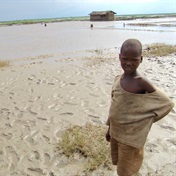- For the first time in 50 years, the UN has convened a global water summit.
- African countries want their water needs considered for health and food security.
- Last year, the African Development Bank invested in projects that provided water access to an estimated 6.8 million people.
To mark World Water Day, themed "Accelerating Change", the United Nations Water Summit (UNWS) got under way in New York for the first time in over half a century.
The summit takes place from Wednesday to Friday, with African countries calling for the prioritisation of water needs in food insecure, fragile, and marginalised communities.
According to the UN, it is anticipated that roughly two-thirds of the world population may experience a freshwater deficit by 2025, and it is predicted that water scarcity in Africa will have reached dangerously high proportions.
Physical and economic shortages, rapid population growth, and climate change are the main contributors to water scarcity in Africa.
READ | 'Water is a right, not a luxury': Joburg residents suffering outages take fight to the City
The 2022, the WHO Joint Monitoring Programme for Water Supply, Sanitation and Hygiene (JMP) said that one in three Africans was affected by water scarcity, 411 million people on the continent still lacked basic drinking water services, while 779 million lacked access to basic sanitation services and 839 million to basic hygiene.
The world was at a crisis point, UN Secretary General António Guterres said in his keynote statement.
He said:
Water security is at the centre of health and food security in Africa.
African Development Bank vice president Dr Beth Dunford said the continental financier had heavily invested in water and sanitation.
"Massive investments in integrated water development and management are central to achieving sustainable water, food and energy security while assuring green and inclusive growth.
"In 2022, our water and sanitation portfolio of $473 million (R8.5 billion) provided water access to an estimated 6.8 million people, and jobs to over 24 000 people in Africa.
"Over the last 10 years, the bank has also invested approximately $5.2 billion (R94.2 billion) in the water sector to support and strengthen water and sanitation resilience for almost 97 million people in Africa. Since 2015, the bank has invested an average of $900 million (R16.3 billion) a year," she said.
Zimbabwe, Ghana, Ethiopia, Uganda, Liberia and Ghana announced their Presidential Compacts, which will "accelerate access to water and sanitation services, including increasing budget allocations, reducing open defecation and delivering climate-resilient services", reads a joint statement from the six countries.
Key commitments from African countries
Ethiopia will revise the loan policy and directives to accommodate loans for water and sanitation for businesses and consumers.
It will also strengthen accountability among water and sanitation stakeholders such as policymakers, service providers and the community, and development partners through establishing a strong accountability framework which aligns with the country's long-term water, sanitation and hygiene programme known as "one wash".
Ghana intends to establish a National Sanitation Authority, reduce inequalities in water and sanitation services, particularly in poor and rural communities, and make the country's cities some of the cleanest in on the continent.
Liberia vowed to increase access to basic sanitation by ending open defecation, as well as creating a unifying monitoring mechanism at all governance levels - be they national, county, district, and community, to improve institutional coordination.
Uganda wants to increase public financing for water, sanitation and hygiene. For Zimbabwe, the State of Emergency on Water and Sanitation, which is intended to trigger budget and coordination prioritisation, has been mooted.
The News24 Africa Desk is supported by the Hanns Seidel Foundation. The stories produced through the Africa Desk and the opinions and statements that may be contained herein do not reflect those of the Hanns Seidel Foundation.




 Publications
Publications
 Partners
Partners
























